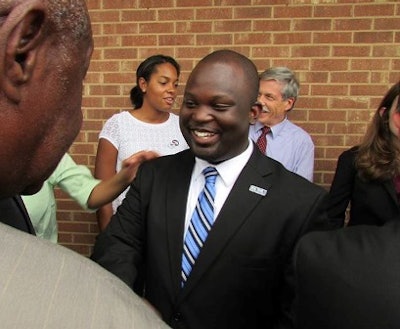 Montravias King, a senior political science major and native of Snow Hill, N.C., is formally launching his city council campaign today.
Montravias King, a senior political science major and native of Snow Hill, N.C., is formally launching his city council campaign today.
The move by the local elections board blocking Montravias King’s electoral bid drew national media attention to Elizabeth City and provoked outcry for what many have perceived as part of statewide attack by Republican local and state officials on minority and student voting rights. King, a senior political science major and native of Snow Hill, N.C., has resumed his candidacy and today is formally launching his city council campaign.
“I’m extremely excited … We knew all along that we were on the right side of the law and the [state] constitution,” King told Diverse. “I’m grateful that I can fully campaign.”
“We’re of course very happy the state board corrected the mistakes of the local board,” said Anita Earls, the executive director of the Southern Coalition for Social Justice. “We felt all along the law was on our side and we were prepared to fight it as long and hard as we needed to.”
The Southern Coalition for Social Justice (SCSJ) provided King legal representation in his appeal that went before the state elections board. Active in the local NAACP and other civic activities involving historically Black Elizabeth City State University (ECSU), King had used his on-campus address when he filed to run for office on July 19, according to news reports.
Richard Gilbert, chairman of the Pasquotank County Republican party, had originally challenged King’s bid and argued that King’s dorm address disqualified him from seeking a city council seat because it’s a temporary residence. Since 2009, King had used his campus housing address for voting purposes and had voted in city, county, state and national elections since then, the [Raleigh] News and Observer reported.
“This case was significant on a statewide level because the local order of the Pasquotank County said that a dormitory could not be considered a permanent residence for the purposes of voting…The North Carolina constitution says that if you are a qualified voter in any election, you’re also qualified to run in that election,” said Clare Bennett, the SCSJ attorney who represented King before the state elections board.
“The requirements for candidates and for voters are the same in terms of residency,” she added.
Earls said the King challenge was not the first time that Gilbert has sought to prevent individuals from the city’s fourth ward, which is where ECSU is based, from political participation. Gilbert previously challenged the right of then-incumbent Kirk Rivers in 2007 from serving on the Elizabeth City Council on residency grounds. Represented by the SCSJ, Rivers, who is African-American, successfully defended his right to remain on the city council by taking his case to Superior Court, Earls explained.
King said his case, along with local election board challenges involving polling sites at or near the campuses of Winston-Salem State University and Appalachian State University, helped attract national media attention, including that from MSNBC news show host Rachel Maddow. In recent broadcasts that were produced in North Carolina, including one in Elizabeth City, Maddow highlighted the new state voter ID law and local election law challenges involving the three campuses.
In early August, North Carolina Gov. Pat McCrory signed into law changes in how residents can vote that includes requiring them to show a photo ID at polling stations, a move that has sparked outcry from the NAACP and other groups.
“I believe that the national attention helped elevate not only my case and my candidacy. But it helped elevate overall awareness of what’s going on in North Carolina, in terms of the voter ID law that was passed and other things this new administration and legislature have done to take North Carolina backwards,” King said.





















